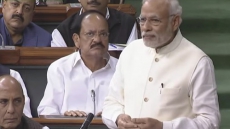There has been no loss of life or major injury since restrictions were imposed in Jammu and Kashmir following the revocation of the state’s special status enjoyed under Article 370 last week, J&K Chief Secretary BVR Subrahmanyam said on Friday. He underlined that restrictions in the regions will be eased in a gradual manner in the coming days.
“There has not been a single loss of life or single injuries to anyone during the course of maintaining peace. We are now taking measures to ease the restrictions in a gradual manner. There will be easing of restrictions in the coming days in an orderly way,” Subrahmanyam told reporters in Srinagar.
Giving details on the relaxation of prohibitions, the official said the offices of the Jammu and Kashmir government functioned normally in the Valley on Friday while schools are scheduled to reopen next week.
“Schools will be opened after the weekend area-wise so that children’s studies do not suffer. The movement of public transport will be allowed in areas around schools. Government offices were fully operational today and attendance was in full high,” he said.
Asked about restoring telephone lines, the J&K chief secretary said: “You will see gradual restoration from tonight and tomorrow onwards. You will find a lot of Srinagar functioning tomorrow morning. BSNL takes a couple of hours to get back to action. Exchange by exchange they will be switching it on. Over the weekend, you will have most of these lines functional.”
Twelve districts in the state were now functioning normally and that limited restrictions were in place in only five districts, Subrahmanyam added.
Kashmir remained shut for the 12th consecutive day today even as authorities relaxed the restrictions in this summer capital of Jammu and Kashmir, allowing people to move around relatively freely for the first time since the Centre abrogated provisions of Article 370 and divided the state into two union territories.
Listing out the measures taken by the government to ensure zero or minimum inconvenience to locals, Subrahmanyam said, “Steps were taken (during the curfew) to ensure there was no shortage of medical services and supplies. Pilgrims going to Haj and returning were facilitated.”
“Periodically, there were relaxations in some of these restrictions to enable them the people to come out for their daily requirements. A sufficient number of passes were issued to the media to ensure their movement,” he added.
The chief secretary also explained the reason behind the Centre’s decision to impose a curfew in most parts of the state. “In implementing the decision (scrapping Article 370) taken last fortnight, cross-border terrorism required the government to put in place certain preventive steps. An important factor was credible inputs that certain organizations were planning to undertake strikes in the state in the immediate future,” he said.
“A few preventive detentions of individuals were also made in accordance with the provisions of law to maintain law and order,” he added. The detentions, he said, however, are continuously under review.
“The history of terrorism required the government to take steps to curb them. A few preventive measures were also made according to the provisions of law to maintain law and order. Similar measures were taken in the past also. Terror groups carry out attacks in Jammu and Kashmir to create fear and block development,” Subrahmanyam said.
